Post Office's go-to expert witness faces a third day of oral evidence, answering questions on his involvement in prosecutions
4pm: Jenkins was stood down as an expert witness in 2013, but this was only communicated by senior colleagues at Fujitsu, not anyone at the Post Office. He did not know the Post Office had doubts about his reliability until 2020, despite legal advices warning the organisation about this in July 2013.
Jenkins says it was a relief to be told he was no longer required as he wanted to get back to the day job.
The inquiry wraps up for the day, with Jenkins returning tomorrow where he will face victims' lawyers.
3.50pm: Cartwright King lawyer Rachael Panter emailed Jenkins in November 2012 saying that the Post Office wanted to serve Jenkins’ expert report detailing the reliability of the Horizon system in a number of Post Office cases, which were listed for trial. She set out six trials set for the forthcoming three months. Panter wanted to serve Jenkins’ generic statement in each case, where the defence teams had raised issues with Horizon in each.
She confirmed the statement had already been served in a different case.
‘Please could you read the case summaries attached, and send five original signed and dated copies of your report to me as soon as possible,’ Panter wrote. Jenkins had not been asked to analyse the data in any individual case.
Jenkins replied: ‘Can’t you use the report I have already sent you?’
Beer asks whether he understood what he was being asked to do by Post Office lawyers.
‘Not really,’ says Jenkins. ‘I think I was just being asked to actually send her five copies.’
3.40pm: The penny was dropping by October 2012 about what Jenkins was being asked to do, after he was told to prepare for a trial a few months later. This email (see below) sent to a colleague shows that he was now worried about how his generic statements were being used.
Beer asks: 'Had you realised you were performing the function of an expert witness?'
Jenkins says: 'Yes, but without understanding what that really meant.'
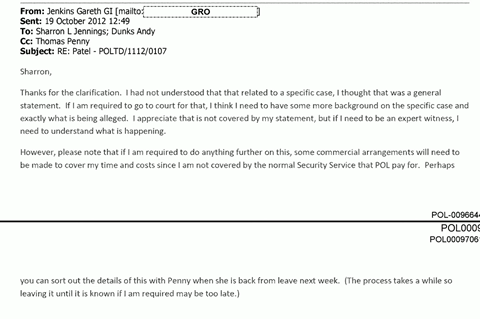
3.35pm: Jenkins says in his written statement: 'There was clearly knowledge within POL of a number of Horizon-related problems. No one suggested these should be included in the report POL had asked me to produce.'
He tells Beer he received no guidance about what should be included in these generic statements being requested by lawyers. 'There were a number of opportunities where others who were more knowledgable of these things then me to actually suggest that I added further things in there and they didn't suggest that to me.'
Then, a big revelation. The phrase 'I understand that my role is to assist the court' was included in Jenkins' statements, but he never wrote that. He tells the inquiry he believes a lawyer from Cartwright King inserted this phrase into statements he provided.
3.25pm: Beer wants to press Jenkins on the statements he was asked to prepare by Jarnail Singh after 2010.
Jenkins writes in his written statement: 'Whilst I understood that Mr Singh wanted a generic report that did not address the specifics of any given case and that responded to the four issues he had identified, I was concerned that I did not know exactly how to approach this task.'
Singh wanted Jenkins to provide statements on the integrity of Horizon without referring to details of each branch or the problems they had suffered. He says now this request was 'totally inapproproate'.
Jenkins sent this email (see below) to colleagues, described as a 'plea for help'. It shows he was feeling under increasing pressure to respond to lawyers.
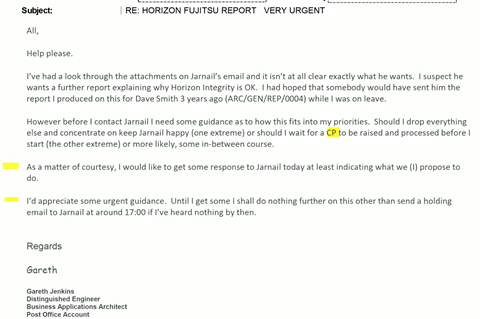
3.15pm: Back after a slightly longer-than-usual break. Sir Wyn asks Jenkins if he has had enough of a break.
'I think, I just want to get this over with,' he replies.
3pm: One colleague emailed Jenkins after the Misra trial, saying: 'Nice one Gareth, looks like you now have a sideline of resident expert witness in future Post Office cases. 🙂'
Beer points out this was a prescient statement, as Jenkins was indeed called on regularly after this.
Beer then brings up an email from Jarnail Singh to Jenkins which he pledges to read word-for-word. Given how many typos there seem to be with Singh’s communications, this gets a laugh in the room. Jenkins says it is a ‘typical garbled email from Jarnail Singh’.
Singh said in the email that Post Office had prepared a document detailing around 20 cases in which the organisation needed a generic expert witness statement ‘confirming the system is robust’.
Jenkins says he thought he was being asked to provide a 'high level overview of how Horizon was working in general'.
2.45pm: Beer asks: 'Were you untroubled and happy with the evidence gave to [the Misra] trial?'
Jenkins: 'At the time I was. I clearly appreciate now that it was not as good as it should have been but at the time I felt happy with it.'
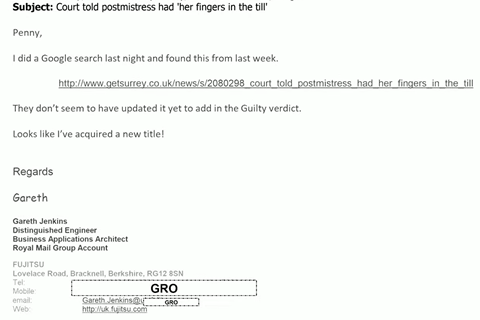
2.35pm: More from the trial transcript. Tatford asked the expert if anything had been found to suggest there was any fault with the West Byfleet equipment. Jenkins said he had found nothing.
He went on to state that the Post Office had proved a ‘rather exhaustive list’ of all the calls to the Horizon helpline and he was ‘quite happy that the level of calls from the branch was typical for other branches.’
2.25pm: Beer says that Misra's defence team repeatedly asked for disclosure of known Horizon faults, but Post Office rejected these requests. Jenkins does not know why.
Then back to the transcript. Jenkins told the court: ‘Clearly if there’s a problem in the accounts then… I would expect the staff to be complaining to the help desk to investigate what’s gone on and that might trigger an investigation by ourselves.’
Plenty of sub-postmasters had indeed complained about Horizon. Jenkins now accepts that help desk call logs were not passed on by Post Office but he states he did not know it was not functioning properly.
2.15pm: A quick lunch break (and writing a 750-word roundup for the weekly Gazette edition) and we’re back. The Misra trial transcript of the exchange between Warwick Tatford, prosecution barrister, and Jenkins show that Tatford asked if he had seen ‘even the slightest symptom of any computer faults’ in his analysis of half a million transactions.
Jenkins answered: ‘No, but then I’ve been doing very sort of high level rough analysis on the stuff. But to find – to do any detailed investigation you need to have some sort of idea about [how] a fault happened at that particular time.’
Jenkins says his answer was correct based on the transaction checks that had been done for 2006 and 2007. Beer suggests this place all the reliance on the defence to look at and understand wider data.
1.05pm: A quick discussion on remote access. Beer is able to show that Jenkins did know in 2010 that Fujitsu could access and alter branch accounts, but this was not disclosed to the Misra trial. Jenkins says it was not relevant to the Misra case. More heads shaking in the public gallery.
Beer calls for lunch and we break for an hour.
1pm: Beer takes Jenkins to a specific section of his written statement. In it, Jenkins states: ‘Nor have I seen any emails that suggest that my raising these event timeout/locking issues prompted anyone within POL or Fujitsu to ask me to provide a witness statement about any other past problems that had affected Horizon.’
Regular followers of the inquiry will know what is coming next. Beer is able to produce two emails from 2010 – one from Singh, one from a Post Office investigator – which ask for details about other problems with Horizon.
Jenkins says he misunderstood the questions at the time and took it to refer to outstanding problems with Horizon.
Beer asks: ‘That [written] statement is not true, is it?’
Jenkins responds: ‘I was thinking of outstanding issues but I accept that I have not qualified it correctly.’
Beer suggests it shows an ‘unwillingness to reveal known problems with Horizon’.
12.50pm: Jenkins thought the receipts and payments mismatch bug to be 'totally irrelevant' to the Misra case. If someone had told him to disclose it to the court then he would have done, he says.
The inquiry hears that Jenkins did make a note of the bug and this note was sent to Jarnail Singh days before the Misra trial (he has previously said he never read this note and did not print it off). Beer asks whether there were now concerns about disclosure of the bug because of the consequences it would have on criminal cases.
'I can understand that now but I don't think I was conscious of that sort of discussion as part of the meeting at the time.'
12.45pm: Meeting notes from 2010 (see below) show that Post Office and Fujistu were seriously concerned about the receipts and payments mismatch bug and its effect on prosecutions. Jenkins was present at the meeting but denies he said the bug could impact on legal cases.
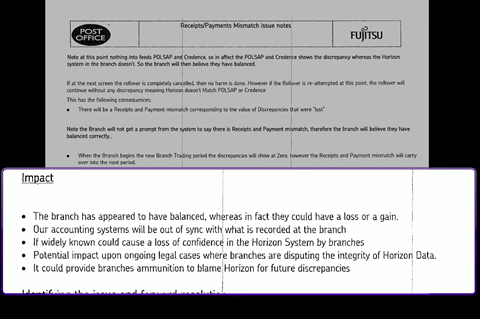
12.35pm: Back for a pre-lunch burst. Before the break, by the way, was the first sign of Jenkins seeming to get riled by some of the questions. At one point, as Beer went through his statements from 2010, Jenkins said: 'I was not expecting every word that I wrote in an internal document to be picked apart in the way it is being picked apart.'
Quick as a flash, Beer responded: 'I apologise for picking it apart, I'm going to continue if I may,' prompting a chuckle from the public gallery.
12.20pm: We have moved to the crucial receipts and payments mismatch bug. In an internal document, Jenkins discussed this issue, which was not flagged up at any point to unwitting sub-postmasters. He talked about how to amend data to correct any discrepancy that might arise from this bug, and said it would ‘need to be carefully communicated to the branches to avoid questions about the system integrity’.
Beer asks: ‘You wanted to avoid questions about Horizon system integrity?’
Jenkins replies: ‘I don’t think that is true.’
We stop for another short break.
12.15pm: Seema Misra is here, by the way, seeing these emails suggesting she was jumping on the bandwagon. The public gallery is very busy, and a few sub-postmasters were shaking their heads during the last set of emails brought up.
12.05pm: Beer has stepped up his questions and is bombarding Jenkins with examples of his own emails from February and March 2010 to get into the mindset at the time of the expert witness.
Around that time, Jenkins emailed Jarnail Singh with his summary of the Misra situation. Jenkins said she had tried to ‘cover up’ losses in her branch and saying that when she went to court, she saw an article in Computer Weekly indicating that Horizon was unreliable and ‘decided to jump on the bandwagon’.
This is a significant moment. The inquiry (see 9.50am) has previously seen Singh use this expression after the Misra trial, but it appears Jenkins also wrote about bandwagons before that. He tells the inquiry this is not the type of word he would use and continues to suggest Singh originated it.
Beer asks whether, given Jenkins’ emails, he was able to act as a dispassionate expert witness in criminal trials.
Jenkins says he could, and adds: ‘I didn’t think the problem was within Horizon. I thought there were other reasons as to what had happened. My focus was on looking to see whether there were any problems with Horizon.'
12pm: The inquiry then sees another brief email from Jenkins to a colleague after being asked to advise on a case in February 2010.
Jenkins said: 'This is another example of postmasters trying to get away with "Horizon has taken my money."'
He apologises for his wording. Beer asks whether he believed this at the time. 'I can't remember what I believed,' Jenkins says. 'I didn't believe there were any problems with Horizon that were causing Horizon to lose money.'
11.50am: We’re back and looking at this 2010 email from Jenkins to a colleague (see below) regarding a case involving two branches in Essex. He says ‘political’ was a reference to high-level links between Post Office and Fujitsu.
Beer asks whether he believed at this stage that he should not undermine prosecutions. Jenkins says he wanted guidance about what he should be doing.
‘Did you need guidance from management on whether you should just tell the truth or not?’ asks Beer.
‘I wanted to make sure I was being covered by management for any decisions that I took.’
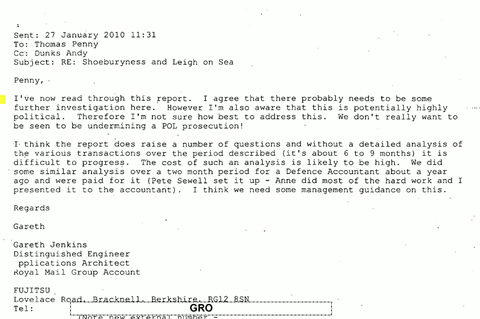
11.10am: Jenkins says he did not make any checks on whether the new bug affected Misra's West Byfleet branch as it was not relevant. In early March 2010 he signed a third witness statement stating he knew about a bug creating system discrepancies, another bug resulting in inaccurate trading statements, and a third new bug. Yet Beer points out none of these were disclosed to Misra. Jenkins says none of these issues were relevant to Misra's situation and it never occurred to him to ask whether they applied to her case.
Remember that none of these bugs were deemed as significant as the receipts and payments mismatch bug, which we have yet to come onto.
We go to a quick break.
11am: Beer pushes the point on the bug being discussed in 2010 that was affecting branch trading statements. This bug was not disclosed to defence lawyers.
Beer asks: 'Did you know that since at least the Lee Castleton case [in 2006] that Post Office relied on the implicit accuracy of branch trading statements when bringing civil claims?'
Jenkins replies: 'I am not sure I had [knowledge of] any distinction between civil or non-civil claims. I know that the branch trading statement was effectively the legal document that was used to say that the accounts had been signed off.'
10.40am: A new document is shown to the inquiry by Beer. These were notes and minutes from a meeting of Post Office and Fujitsu staff to talk about bugs in Horizon, held in February 2010 – months before Misra’s trial. Jenkins was present.
Participants discussed a bug found which had been discovered at a branch in Derby. The minutes recorded: ‘The net effect [of this bug] would be that the Post Office and the branch records would not match. Where this happens, the Post Office investigates the branch and postmaster, with a view to retraining or even uncovered fraud. It would seriously undermine Post Office credibility and possibly historic cases if it could be shown that a discrepancy could be caused by a system error rather than postmaster/clerk action.’
Jenkins says it did not occur to him that this issue should be raised in the Misra or any other case, and he only thought about fixing it.
Beer asks: ‘You were stepping out of the computer lab and walking into a court weren’t you?’
Jenkins replies: ‘I didn’t realise that there was that difference that I needed to think about and no-one advised me as to that.’
10.20am: Singh did eventually ask for transaction logs from Misra's West Byfleet branch over a limited time, from January 2006 to December 2007. Jenkins and Fujitsu supplied this data. Jenkins says he did not question why the Post Office was asking for particular disclosure.
The inquiry sees Jenkins’ final statement, which makes reference to ‘occasional faults’ such as one found at a branch in Falkirk. It added: ‘Any such faults, whether found during testing or from live user feedback would be investigated and resolved appropriately.’
Beer says this conditional sentence tells the reader that effectively there were no other relevant bugs, and those that had been found had been dealt with. It was an attempt, he suggests, to avoid disclosing the existence of specific other bugs.
Jenkins tells Beer he believed other bugs had been investigated and dealt with at the time of making his statement.
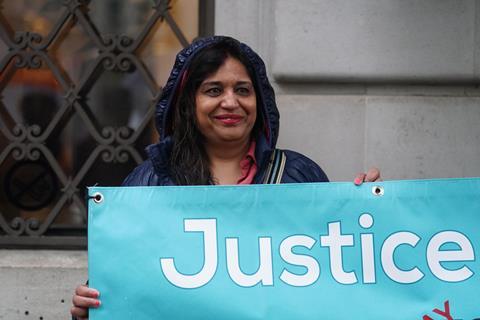
10.10am: Lawyers acting for Post Office asked whether Jenkins could mention in his expert witness statement whether there were any known problems with the Horizon system.
Jenkins emailed Fujitsu’s lawyer David Jones asking for guidance. He said then that he was ‘reluctant to make a clear statement’ as he was aware of one problem with transactions lost due to computer locking issue. Inquiry counsel Jason Beer KC points out Jenkins did not mention at this point that he was aware of other faults in the system: Jenkins says he thought someone else would be covering this.
Jones later expressed surprise that Post Office was not asking for more information on transaction logs and told Singh that Jenkins was not in a position to make a clear statement.
10am: Jenkins describes the Post Office's handling of the Misra case as 'fairly chaotic'. He would receive emails asking questions he had already answered, particularly from Jarnail Singh. The engineer says he was not given clear instructions about what was expected of him and he was having to make 'all sorts of assumptions'. He believed this was just how prosecution cases worked.
Jenkins confirms that he felt under pressure and uncomfortable with what was being asked of him by the Post Office, coming at the same time as doing his day job.
9.50am: Misra is one of the key figures in the Post Office scandal, partly because of the particulars of her case and partly because of what it meant to the Post Office. She was pregnant with her second child when she was found guilty of theft and jailed for more than a year. She gave birth still wearing an electronic tag.
The case was viewed as vital within Post Office for seeing off the criticisms about Horizon that formed part of Misra's defence.
The inquiry has already seen an email following the conviction sent by Post Office solicitor Jarnail Singh, who wrote: ‘it is to be hoped the case will set a marker to dissuade other defendants from jumping on the Horizon-bashing bandwagon’.
9.45am: Jenkins is back, Beer is back, Williams is back. The key players are here and seated as Gareth Jenkins starts a third day of oral evidence. This could be his trickiest yet as it focuses on the conviction in 2010 of Seema Misra. We're expecting the lawyers' role to come under very close scrutiny.
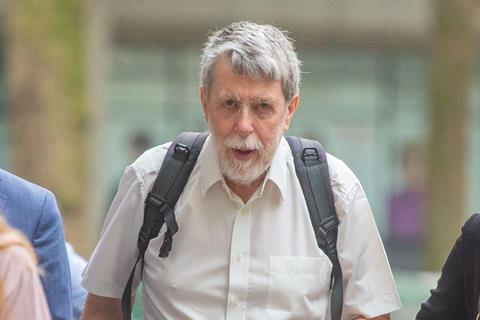




































No comments yet